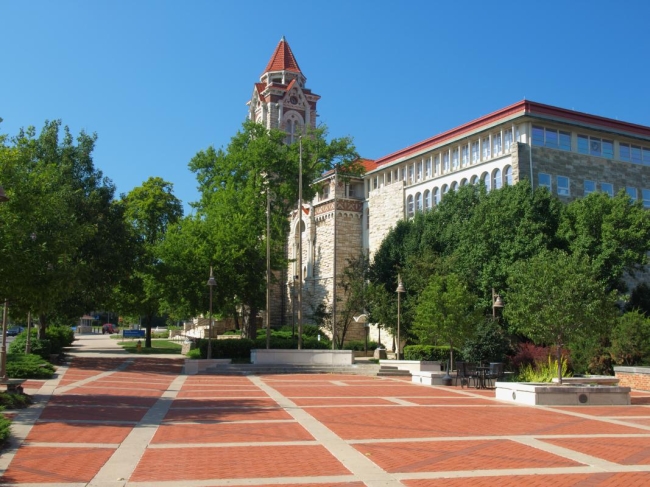You have /5 articles left.
Sign up for a free account or log in.

Faculty members at the University of Kansas disagree with a number of proposed program cuts in areas such as humanities and visual art education.
iStock/Getty Images Plus
Faculty members at the University of Kansas are pushing back on a plan that would eliminate 42 academic programs, arguing that a number of the proposed cuts are not in the best interest of the university and would undermine its educational mission to serve students.
The KU University Senate agrees with 28 of the 42 proposed cuts, mainly programs that are largely inactive and will not affect students and faculty if eliminated. But faculty members have deemed 14 others too important to cut, leading to a standoff with the administration.
Both the University Senate—which is comprised of staff, faculty and students—and the Faculty Senate have raised objections with KU leadership over the depth of the proposed cuts.
The 14 programs that faculty members want to save include bachelor’s degrees in humanities, Latin American and Caribbean studies, visual art education, and a variety of minors, master’s and Ph.D. programs spanning a broad range of disciplines.
What’s at Stake
According to online statements from faculty members, some programs—such as humanities—were being considered for discontinuation as early as 2020. Plans for program elimination became clearer last year, when Provost Barbara Bichelmeyer discussed cutting certain programs at a Kansas Board of Regents meeting in February 2021. Meeting minutes note that KU sought to discontinue or consolidate low-enrollment programs as the university grappled with a $75 million budget shortfall. Bichelmeyer then brought the recommendations forward to faculty last fall.
Faculty members sent Bichelmeyer a letter in December urging her to save 14 of the programs tapped for reduction but now say she has decided to drop 12 of those they asked her to spare, with determinations yet to be made on the other two.
Bichelmeyer’s recommendations will go to KU’s chancellor for final approval.
“Of course we need to be efficient, and at the end of the day you have to pay your bills,” Rémy Lequesne, president of the Faculty Senate, told the Lawrence Journal-World this week. “The faculty understands that, but there are reasons to teach certain topics that go beyond economics. There are reasons to teach art and music and other things that may not make dollars-and-cents sense, but they enrich us and are worth investing in.”
Lequesne, who declined an interview request, added, “Reasonable people can disagree, but in this case, overruling the University Senate so consistently is very disturbing to many of us.”
Neither Bichelmeyer nor any other university representative responded to a request for comment.
Hossein Saiedian, president of the University Senate, also declined an interview request. A number of faculty members, however, have outlined their objections to these program discontinuations in dozens of statements posted on the University Senate website.
“The last few months have highlighted the enormous value of the arts and humanities as they inform and inspire people across the United States and around the globe,” Margot Versteed, a KU professor and director of the humanities program, wrote in a statement posted on the University Senate website. “The pandemic has shown that humanistic thinking is absolutely essential because it provides us with wisdom, perspective, and context. In these trying times we need to formulate collaborative responses that transcend disciplinary boundaries and offer new approaches to disturbing issues. KU’s Humanities Program offers precisely these responses.”
Further Eliminations in the Future?
Though administrators remain tight-lipped on proposed program cuts and faculty members are reluctant to discuss the matter publicly, some insights into systemwide planning can be gleaned from the most recent Board of Regents meeting, where state officials approved a contract with the education consulting firm rpk Group to conduct a broad academic portfolio review.
According to a presentation from rpk Group, the review aims to understand how programs align with student interest and lead to successful outcomes, identify areas of duplication within the six bachelor’s degree–granting universities overseen by the Kansas Board of Regents and recommend ways to optimize the academic portfolio to reduce duplication, determine whether current academic offerings meet state and national workforce needs, and provide recommendations on program investment and reallocation.
Katie Hagan, a senior associate at rpk Group, told the Kansas Board of Regents that the company would “look for areas of duplication across the institutions and make recommendations for optimization to reduce that duplication, or for different campuses within the system to leverage each other to make sure that the investment the state is making and that the students are making is being realized with the greatest degree of stewardship.”
According to the presentation, work on the academic portfolio review is set to kick off next month, with data collection to begin in April, followed by a final report and presentations in August and September.
Rick Staisloff, founder of rpk Group, noted there is often unease about such program reviews and suggested the end goal is to allow the University of Kansas system to best identify areas to invest in, in order to grow, rather than to focus on cost savings through program elimination.
While some crucial programs must be subsidized, Staisloff said, it’s important to have accountability and approach program review with a focus beyond the bottom line.
“There’s often a fear that this is about cutting, about doing less, right? And really, it’s about an emphasis on where might we invest so that we can grow, create more sustainable models and be delivering learning in ways that best support our students [and] best support our employers,” Staisloff said.








